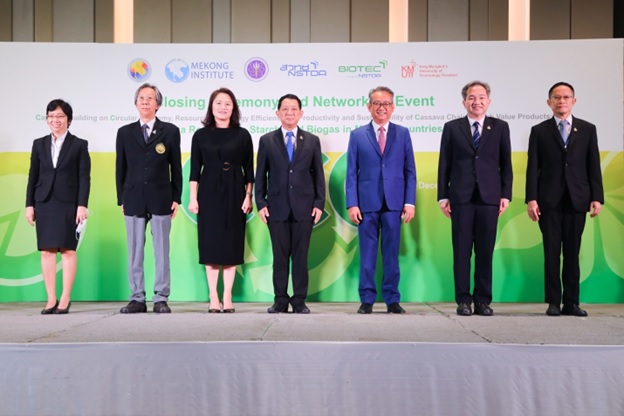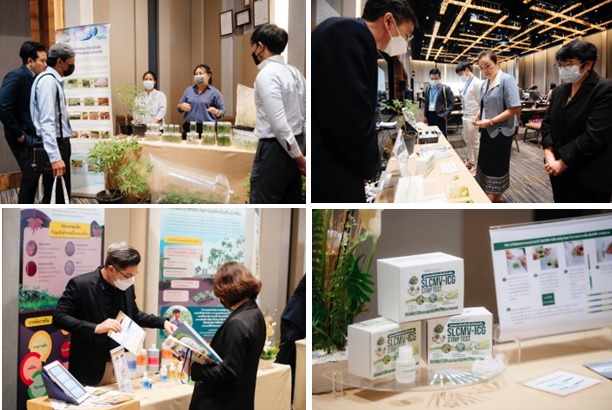BIOTEC-NSTDA recently hosted a closing ceremony and networking event of the project titled Capacity Building on Circular Economy, Resource and Energy Efficiency for Productivity and Sustainability of Cassava Chain to High Value Products: Cassava Root, Native Starch, and Biogas in Mekong Countries, or CCC.

Prof. Sirirurg Songsivilai, Permanent Secretary for Higher Education, Science, Research and Innovation, remarked that cassava is an important crop not only from the food security perspective, but also from the social and economic perspective, as it represents the main income source of over 2 million farmers in the ASEAN region and contributes to other industries such as textile and energy.
NSTDA President Prof. Dr. Sukit Limpijumnong said that since 1995, BIOTEC-NSTDA has been working with the Ministry of Industry, Ministry of Energy, universities, associations, and foundations in Thailand and abroad to develop knowledge and technology to enhance the competitiveness of cassava industry, ranging from efficiency improvement in cassava production and processing to waste treatment and upcycling. Knowledge and experience accumulated over three decades has led to the initiation of this CCC project.
BIOTEC Executive Director Dr. Wonnop Visessanguan revealed that the CCC Project received THB 12.96 million (approximately USD 394,005) in financial support from the Mekong-Republic of Korea Cooperation Fund (MKCF) for the 3-year implementation from 1 July 2020 to 31 December 2022. The project aims at providing comprehensive training – covering the technologies from upstream (cassava breeding and cultivation for higher productivity) to mid-stream (energy and resource efficiency improvement in cassava starch processing) and downstream (biogas production from cassava wastewater and pulp) – to personnel involving in the cassava value chain, as well as establishing ASEAN Cassava Center in Thailand to serve as a regional and global hub for cassava technology and knowledge transfer.
Project leader Dr. Warinthorn Songkasiri disclosed that the project has trained 102 individuals from all sectors in the cassava value chain, exceeding the target set in the proposal. ASEAN Cassava Center has already been established to facilitate technology transfer to partner organizations in the region. In addition, a virtual National Cassava Center has been set up with a plan to develop into a physical center in the near future. The success of CCC project has paved a pathway for two new projects. One project focuses on studying resource use and carbon footprint of cassava starch production in Thailand with funding from the Thai Tapioca Starch Association and participation of 60% of cassava starch factories in Thailand, whereas the other aims at implementing a CIGUS model to drive high-impact research for cassava industry with financial support from Thailand Science Research and Innovation (TSRI). Both projects will play a vital role in improving the competitiveness of cassava industry in Thailand and the region.
Despite the end of the CCC project, the Thai research team will continue to collaborate with partners from neighboring countries through ASEAN Cassava Center and Train-the-Trainer Program funded by the Lancang-Mekong Cooperation Special Fund. The Train-the-Trainer Program under Lancang – Mekong Cooperation is designed to enhance the production capacity and people’s livelihood by improving the value chain for cassava cultivation and application.

